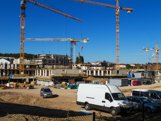Popular Lisbon: 5 reasons to buy a property
 Today, it is safe to talk about a new trend in the real estate market: at the peak of popularity among investors, the capital of Portugal – Lisbon!
Today, it is safe to talk about a new trend in the real estate market: at the peak of popularity among investors, the capital of Portugal – Lisbon!
A stable political and social environment, a modern education system, a low crime rate, a high standard of living, a strengthening of the Portuguese economy, government programs aimed at attracting foreign investors, as well as measures that promote the direct development of Lisbon, bring their results. According to analysts of the company PwC, in 2019, Lisbon will be the leader of the rating of the cities most attractive for investment.
Lisbon is called the second Barcelona
Lisbon called the second Barcelona artfotoss /
1. The growth of the Portuguese economy and the development of Lisbon
The Portuguese economy is developing steadily. According to PwC, this country’s GDP increased by 2.4% by the fourth quarter of 2017. Experts predicted that in 2018, GDP growth will be 2.1%, and in 2019 – 1.7%.
The unemployment rate is noticeably decreasing: in January 2017, it was possible to talk about 10.1%, and in January 2018 – already about 7.9%.
In 2017, the Portuguese Federation of the construction industry (Fepicop) recorded an increase in production in the construction sector by 5.9%, which finally allowed to overcome the decline that had reached over the previous 19 years, reaching 52%.
Production in the construction sector in Lisbon is steadily increasing
The volume of production in the construction sector of Lisbon is steadily growing gustavofrazao / Depositphotos
Thanks to the implementation of the government program (Instrumento Financeiro para a Reabilitação e Revitalização 2020), aimed at restoring and reviving the city, most construction projects (about 80%) are associated with the restoration of buildings.
According to the strategic plan of the Programa Operacional Regional de Lisboa 2020, Lisbon plans to create an innovative large-scale “ecosystem”, which should positively affect the growth of the city’s population and the number of jobs, as well as improving the quality of life. The program regulates issues of energy efficiency, rehabilitation of dilapidated buildings and undeveloped territories, optimization of the interconnection of all city services and systems. The projects included in it involve an investment of 307 million euros.
Lisbon (along with London, Milan, Warsaw, and others) joined the European network Sharing Cities. The center of the Portuguese capital has become a “laboratory” for testing new technologies designed to qualitatively improve the lives of citizens. A quarter of 10 km² with a population of 100,000 inhabitants included the main historical and tourist streets of the city. Here, 540 charging points for electric vehicles were installed, 64,000 smart street lamps, and the Sustainable Energy Management System (SEMS) was introduced to integrate and optimize energy flows. In Lisbon, the transition to renewable energy sources, including solar, is also encouraged.
Portugal’s Prime Minister Antonio da Costa, in an interview with Forbes magazine, announced its intention to make Lisbon the world capital of entrepreneurship.
In 2016–2018, Europe’s largest technology and medical conferences, meetings and congresses, web summits were held here. The International Congress and Conference Association (ICCA) has recognized Lisbon as one of the most sought-after cities for international events due to its excellent infrastructure, accessibility and the advantageous price / quality ratio of hotels and services offered to participants.
Thanks to investments in engineering education and digital infrastructure, Lisbon began to form its own “ecosystem” of support and development of innovative technologies and start-ups. Local technological startups (Aptoide, Mellow, Talkdesk, Codacy, Unbabel, etc.) successfully operate, and business incubators Startup Lisboa, Labs Lisboa, Inovisa and Tec Labs operate.
2. Rising real estate prices
Eloquently, the numbers say. The growth in housing prices in 2017–2018 was 23%. According to the State Statistics Institute of Portugal (INE), residential real estate sales grew by 19% in Portugal and by 22% in Lisbon over the first and third quarters in 2017–2018.
This was due to the increasing demand for real estate and the general improvement of the economic situation in the country. Many international corporations seeking expansion have drawn attention to Portugal. In addition, some investors admit that they are transferring capital from “unstable” Catalonia here.
State policy aimed at supporting startups, including foreign ones, attracts young entrepreneurs who need housing in the capital.
According to Filippo Simonato, director of business development at JLL, “the average cost per square meter in Lisbon is 3-4 thousand euros in old buildings, 5-7 thousand euros in new buildings and about 10 thousand euros in buildings located in the center cities. To buy an apartment in the center of Lisbon will need at least 200 thousand euros.



